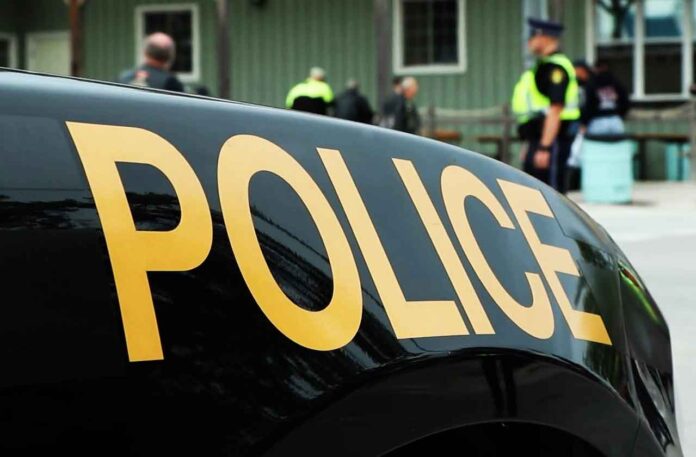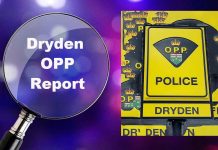
NORTH CARIBOU LAKE FN – NEWS – During a collaborative operation by the North Caribou Lake Ontario Provincial Police (OPP) and local checkpoint guards on February 25, 2024, a routine vehicle inspection turned into a significant drug trafficking intervention.
This operation underscores the importance of vigilance and cooperation in maintaining community safety and combating the scourge of illegal drugs.
Collaborative Inspection Effort
The partnership between the OPP and the North Caribou Lake Checkpoint Guards played a crucial role in identifying and addressing illegal activities. The checkpoint inspection not only showcases the commitment of local law enforcement to safeguard the community but also highlights the effectiveness of routine checks in detecting criminal undertakings.
Seizure of Drugs and Weapons
The inspection led to the arrest of Florence McKay, 46, from Dryden, and the seizure of a notable quantity of illicit substances, including cocaine, crack cocaine, and various pills. Additionally, two edged weapons and paraphernalia associated with drug trafficking were confiscated, preventing these dangerous items from circulating within the community.
Legal Proceedings and Community Appeal
Following her arrest, McKay faces multiple charges under the Criminal Code and the Controlled Drugs and Substances Act, emphasizing the serious legal consequences of drug trafficking.
Released from custody, McKay is scheduled for a court appearance on April 25, 2024.
This case serves as a reminder of the ongoing battle against drug-related crimes and the role of the community in aiding law enforcement efforts. Authorities encourage anyone with information on illegal drug activities to contact the OPP or anonymously through Crime Stoppers, reinforcing the collective responsibility to foster a safe environment.
Protecting Children and Grandchildren from the Dangers of Illegal Drugs
Remote First Nation communities, including North Caribou Lake, face unique challenges in protecting their youth from the perils of illegal drug use. The geographical isolation, limited access to resources, and the devastating impact of substance abuse on these communities necessitate a tailored approach to safeguard the younger generations.
This article explores effective strategy ideas that can be employed to enhance the safety and well-being of children and grandchildren in these areas.
Understanding the Threat
The first step in combating the danger of illegal drugs is understanding the scope and nature of the threat. In remote communities, the lack of recreational facilities and limited employment opportunities can contribute to drug abuse among the youth. Recognizing these factors is crucial in developing targeted interventions.
Community-Based Solutions
Building strong, resilient communities plays a pivotal role in drug prevention. Initiatives can include the establishment of community watch programs, which involve residents in monitoring and reporting suspicious activities.
Collaboration with local law enforcement, such as Nishnawbe Aski Police and the Ontario Provincial Police, can ensure that concerns are addressed promptly and effectively.
Furthermore, community-led cultural and recreational programs can offer healthy alternatives to drug use, promoting traditional values and a sense of belonging among the youth.
Education and Awareness
Education is a powerful tool in the fight against drug abuse. Schools and community centrws should implement comprehensive drug education programs that inform children and teenagers about the risks associated with drug use.
These programs should be culturally sensitive and tailored to the specific needs and experiences of First Nation communities. Additionally, inviting speakers who have overcome substance abuse to share their stories can provide powerful testimonials and relatable insights into the dangers of drug use.
Support Networks and Rehabilitation
Creating strong support networks is essential for individuals struggling with substance abuse. Community-based support groups, peer mentoring programs, and access to mental health services can provide the necessary assistance for those in need.
For communities like North Caribou Lake, developing partnerships with nearby health centrws and rehabilitation facilities can enhance access to treatment and recovery services.
Conclusions
The battle against illegal drugs in remote First Nation communities like North Caribou Lake requires a multifaceted approach that involves education, community action, and support. By fostering a community environment that prioritizes the health and safety of its youth, these communities can build a strong defence against the dangers of drug abuse. It is through collective effort and commitment that the future generations can be protected and empowered to lead healthy, fulfilling lives.
Recognizing the Trap Houses and Bootleggers
n small remote communities, where everyone tends to know each other, recognizing drug houses and bootleggers can be crucial in safeguarding the community from the dangers of illegal substance distribution.
Drug houses often exhibit certain telltale signs that residents can be on the lookout for.
These include unusual amounts of traffic at all hours, with cars and individuals coming and going frequently for short visits, which suggests more than just social calls.
The appearance of the property might also provide clues; neglected maintenance, blackout curtains, or surveillance cameras can be indicators of illicit activities taking place inside.
Additionally, residents might notice a general sense of secrecy around the premises, with occupants avoiding contact or being visibly cautious about who is watching them.
Bootleggers, individuals who illegally sell alcoholic beverages, also present a challenge in small communities, especially where alcohol restrictions are in place.
Similar to drug houses, the operations of bootleggers might be indicated by an unusual influx of visitors, especially at odd hours, hinting at transactions beyond normal social interactions.
Other signs include the presence of large quantities of alcohol containers, secretive behaviour when dealing with customers, and reports of noise complaints from neighbours. Bootleggers might also use common communication tools, like social media or messaging apps, in a manner that seems cryptic or coded to arrange sales and pickups, keeping their operations under the radar.
For residents in these small, remote communities, vigilance and community cohesion are key tools in recognizing and addressing the presence of drug houses and bootleggers. Establishing open lines of communication within the community, including neighbourhood watch programs or community meetings, can enhance awareness and collective action.
It’s also important for residents to report suspicious activities to local authorities, providing detailed observations without putting themselves at risk.





